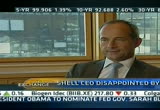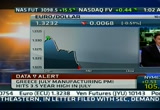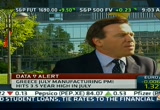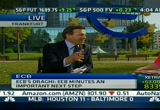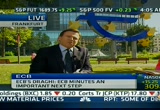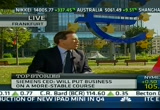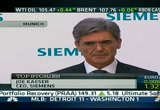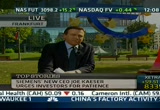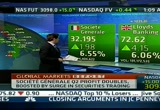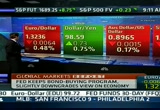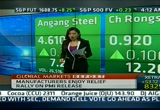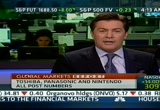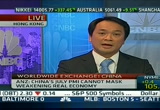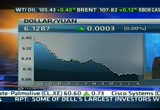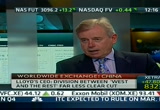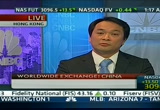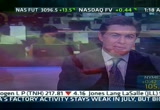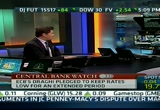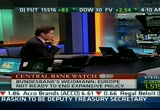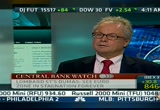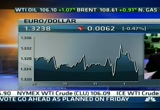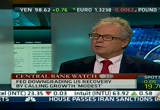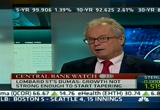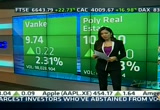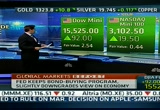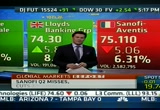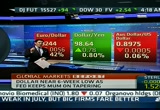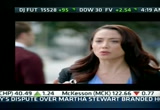tv Worldwide Exchange CNBC August 1, 2013 4:00am-6:01am EDT
4:00 am
hello. you're watching "worldwide exchange." i'm ross westgate. the headlines today from around the world, relief for investors. official pmi data shows china's manufacturing sector returned to growth. in europe, the markets waiting for forward guidance from the ecb and bank of england. better than expected earnings from softgen. >> i'm very happy with business performances on the french retail, strong growth of revenues plus 3%, improvement of
4:01 am
income, so that's very positive. and the shell ceo admits to a disappointing second quarter. investors agree they sent shares lower in london. >> you have a complex kind of result because we had impairments, we had effects like big foreign exchange movements and also we have a situation in nigeria which is giving us some concern. japan's top consumer electronics companies on the road to recovery. sony and sharp both deliver better than expected earnings. analysts aren't sure if that's enough. warm welcome to the program. we kick off with eurozone manufacturing pmi growing for first time in two years in july.
4:02 am
factory outputs surging. markets using pmi up to 53.3 in july. from june's 48.8. revised slightly higher from the preliminary reading of 50.1. and over that 50 threshold for the first time since july 2011. follows a string of fairly good or more promising economic data out of the eurozone. unemployment also falling slightly. did revise actually the june number. still near the record high. euro/dollar during the session tracking down, 1.3232. was 1.33 post the fomc and u.s. data as well. just got the greek component of that. it hit a 3 1/2 year high in july as well. so that little bit of data will
4:03 am
play into the ecb's discussions. but by how much? jeff and annette are in frankfurt for us with the decision today. hello to you both. jeff? >> good morning, ross. the key question here for mr. draghi and for the market is what represents escape velocity. you walk through the pmi numbers and at core europe level it does appear there is a steady lifting out of these recessionary-like conditions. but it is very, very slow and steady. and the spanish number will not help in that argument. the issue then is does mr. draghi feel obliged at this stage with some of this data series getting better, even if we're not at escape velocity, do we need to see anything more happen today on the rates front or does he need to be any more specific about guidance, annette? >> i think very much on the rates front you won't see
4:04 am
anything particularly. i mean, above 4, the rate still has to affect into the markets. lending rates, where we don't really see any change, right? and on the forward guidance issue, we both very vividly remember how didn't really like to embark on more details here on the forward guidance issue and the ecb made it pretty clear when mr. asmussen had his little slip and said forward guidance more than 12 months and they back tracked in -- yeah, i think in two hours or so, so not a lot of things to expect from that front. but perhaps on the minutes, right? >> it is surprising that asmussen slip. they're normally so good at managing the message. in fact, they are -- they take this to a new art form at the ecb when it makes sure journalists get the right line here from the bank. but this one about minutes is interesting. some of the analysis i read out
4:05 am
there in the market place suggests this is just a decoy to -- in a sense, this meeting distracts some of the market participants and journalists away from this queasy feeling of unease over greece, portugal, and mr. rajoy's recent problems over allegations of misdeeds. but minutes, are we moving to a point where they start to give us details on every council member's decision, do you think? >> i don't think so. most likely they'll hear from him that he'll have that -- give that to the governing council and they are going to vote on it. and probably not more from that front. perhaps they already voted on it. that would be the big surprise, right? >> yes. so to round up the ecb, caution on the economy, probably no move in interest rates, some more chatter about putting this proposal to the council on the minutes. and we're not expecting a specific number on forward
4:06 am
guidance, but you never know. mr. draghi has been known to surprise us in the past. the other surprise, of course, is how rapidly siemens, this massive german industrial giant, has changed its leadership. >> yeah. and some people would suggest that this is not really something which went according to the corporate governance rules like they should be in place. more like a coup against peter loscher who allegedly never made it to arrive completely at the company meeting, that he never, as the first outsider as a seamesea siemens ceo made enough, wasn't up to speed on all the markets. they have 60 units, can you imagine that? >> what is the new man saying about how he turns around this super tanker of a business and starts to push profits and
4:07 am
revenue in the right direction? >> well, the new man, his name is joe kaeser, or kaeser, i should say, how it is pronounced in german, it is the former cfo, of course, now he's the ceo of the company. and he made pretty clear that a lot of things is very good at siemens, so peter loscher's legacy is not completely destroyed. but there are, according to him, roughly 10% missing. take a look -- or take a listen at what he said yesterday during that surprise press conference as well. >> translator: the new target will then be 10% instead of 12% or another figure, ladies and gentlemen, is not important alone. that is not solely important. what is important is really central, two things, first that we reduce or close the
4:08 am
probability gap between us and the competition. have better performance with relation to the market. and, second, that all measures and i'm referring to really all measures, the aggregate total, are designed to be sustainable so that they have a structural impact beyond 2014. they need to be resolutely pursued because siemens will still be around after 2014. >> so that is most likely the end of peter loscher's very ambitious targets. another one, the 100 billion turnover target, no top priority anymore, jeff. >> we'll send it back to you, ross. join us shortly. we'll get more analysis on this ecb decision here today in frankfurt. for now, back to you in london. >> all right, jeff, thanks for that. and annette, of course. up to speed with where we stand ahead of the ecb a little later.
4:09 am
we kick off with comments from mariano rajoy, the spanish premier, who is speaking in light of the slush fund scandal. said we're going to have a new transparency law by the end of the year and will tighten up rules for public contracts and anti-corruption laws as well. so that's where he stands at the moment. up to speed then with where equities are trading. ahead of the bank of england decision today, and manufacturing pmi coming out too in around 20 minutes. ftse 100 up a third of a percent. xetra dax, up by three-quarters. ftse mib, .3%. the ibex up around .2%. number of individual stories we're focusing on, socgen, boosted by a surge in securities trading. the firm keeping its 2015 profit target, said cost cutting plan announced in the previous quarter is being implemented. the stock up 6.5%. lloyds, banking group, up 6%
4:10 am
today after profitability the first half improved. british bank posting net income of 2.1 billion pounds, after a loss a year ago. lloyds said it was considering reinstating dividend payments. lloyds used to be known for dividend payments. they might be coming back. sanofi down 6.5%. second quarter profit declining more than analysts expected because of patent losses and current volatility. cut its goal for 2013, seeing results coming in below the 2012 figures. and finally shell as well down 4.3%, posting an unexpected 20% slip in second quarter earnings. profit lower than a year ago because of a $700 million hit from disruptions at its nigerian operations. earlier, the ceo peter voser, talked about the numbers. >> we have a complex kind of results because we had impairments, we had market
4:11 am
effects like foreign exchange movements, but also we have a situation in nigeria which is giving us some concern. so all the production out because of shutting down pipelines. if i stay forward with that, we made $12 billion of cash, we are in a four years cash flow target period. we made $70 billion of cash. i think we are on our journey to deliver. >> peter voser from shell. on the bond markets, following the stronger than expected u.s. data yesterday, the fed statement that seemed to trump and seem dovish. at one stage, 2.7% was the yield. they went down 2.58%. right now, just below 2.6%. gilt yields lower, below the 2.3%. on the currency markets, euro/dollar, 1.3345. has come down to 1.3236. dollar/yen back over the 98 level.
4:12 am
aussie/dollar continues to weaken once again as well. we had chinese pmi data out, the official number coming in a bit stronger than expected. the hsbc number was weaker. how have we reacted to that? sixuan has more market reaction for us in asia. hi, sixuan. >> thank you, ross. a positive session in asia this thursday. nikkei 225 is among the top gainers, closing higher by 2.5% with a weaker yen helping exporter stocks. shanghai composite added 1.8%. better than expected official pmi data boosted market sentiment. the state council also pledged to step up spending on urban infrastructure projects and public services. manufacturers facing overcapacity issues enjoyed a relief rally. in hong kong, amgang steel and
4:13 am
rongsheng industry surged over 12% after announcing plans to issue convertible bonds to a private equity fund. chinese property stocks also extended a three-day rally after latest data shows july new home prices jumped nearly 8% if a year ago. while a top official says the price increases in first year cities are not severe, and the trend will continue. and on to some big movers in japan. toshiba shares slumped by about 3% as its q-1 profit missed forecasts. panasonic on the other hand climbed almost 7% today, thanks to decent operating profit numbers. nintendo also shrugged off weak sales. a weaker yen helped boost the company's bottom line and the stock gained by 5% today. back to you. >> all right, sixuan, thanks for now. catch you a little bit later. so how is this all playing?
4:14 am
joining us for first part of the program today, richard ward, ceo of lloyds of london. and raymond young, senior economist of greater china in hong kong. welcome to you both. let's pick up with you, first of all, what is your takeaway from the official pmi data and what -- the disparity between that and the hsbc number? it is getting bigger. >> yes, i think i'm not convinced about the official pmi that had reported about 50, which should have been reflecting the economy still on an expansion mode. but over the past half a year we see there is a discrepancy between the official pmi and the hsbc pmi. we have seen exports have been declining, industrial production has been declining. so i don't think today's release of the official pmi above 50 has actually reflected a turn around of the economy. we think that the real economy
4:15 am
is still very weak. >> yeah, but is it weak enough to warrant a response in terms of policy? >> obviously we have seen the central governments released a slew of measures over the past few weeks include something structural reform measure, cutting tax rate or micro and small enterprises. all these things are good. all these things reflect trying to attempt to reform the economy as the development model. it doesn't mean china is going to launch a big scale stimulus measure. what it needs at the moment is a more accommodative monetary policy. we have seen the interest rate in china so high compared to the rest of the world. liquid condition is still very tight. this is what the governor needs to do at the moment, but haven't done that in the past few months. >> in your view of -- from where
4:16 am
you sit, your view of what is going on with china and the emerging markets. these have been places on the margin, produced the extra growth and hasn't panned out. >> it hasn't panned out at the moment. what we're doing in emerging markets is very much a long-term play. you got to recognize with insurance and the business that we write, it takes quite a while to establish a presence for the demand to kick in. so what we're hoping over the next few years that will happen. of course, these figures coming from china are slightly disappointing. we're all hoping that the chinese economy to be somewhat more buoyant and the sluggish figures would suggest. i'm expecting our numbers to be sideways for a little longer. >> clearly this development, trying to move to more service economy, manufacturing base, but how long is that going to take in your view in the service industry? >> that's going to take a while. if you look at the risks they're facing as businesses, and clearly they do need the products we offer in the
4:17 am
insurance world, take you back to the earthquake in 2008, the economic damage from that earthquake was 128 billion u.s. dollars. the insured losses were less than $400 million. so the country is running in exposure it needs to manage. with the economic activity we're seeing, they clearly need to get more involved in risk management and transferring the risk from the state to the private sector. and using insurance to achieve that. i do expect it to happen over time. >> raymond, you mentioned here that the pboc should shift to more accommodative stance and cut policy rates. do you expect -- do you really expect that to happen soon or will that be a while? >> we have seen the pboc has been very reluctant to cut the benchmark rate. two weeks ago they tried to remove the lending flow rate, completely remove that. but they have not removed the ceiling of the deposit side. so we have not seen that have
4:18 am
any effect on the rate. what it needs is they really need to have a very good signal about the monetary stand of the pboc at the moment, that they really want to accommodate what the central government is pushing forward, which is promoting infrastructure investment, trying to boost the services industry and all these things are good. they also need to inject some liquidity in order to smooth all the reform efforts. >> okay. good to see you, raymond. thanks for that. nice to see you. richard is with us for the first hour of the show. also on today's program, japan's economics and trade ministers told cnbc that abe's government will pursue reform until inflation is dead. we'll bring you the interview at
4:19 am
10:40 cet. u.s. automakers are expected to post another solid sales month. are detroit's big three on the road to recovery? analysis at 11:45. allegations of tax avoidance have become reputational poison for global firms according to lloyd's new risk report. richard is here with us. he'll tell us why. and french banking giant socgen has a surge in second quarter profits. stephane will give us more with a first on cnbc interview from the group's ceo. that's up after the break. [ male announcer ] it's time.
4:20 am
4:22 am
now, societe generale profits doubled in the second quarter from a year ago. stephane has been speaking to the man at the helm. he joins us now. stocks doing pretty well this morning. >> hey, ross. yeah. good set of results for societe generale, good set of numbers for the second quarter, boosted by the strong performance of the corporate and investment banking division. the recovery of the international retail banking unit and the good resilience of the french retail banking, the bank also reduced its operating expenses by nearly 2% on the quarter as a result of its cost reduction plan. in terms of outlook, the bank
4:23 am
confirmed its target for retail on equity of 10% in 2015 and the ceo of the bank frederic oudea believes the market conditions would remain accommodative. >> always difficult to predict on the capital market. i think the market might remain relatively overall accommodative. what is very clear in the results of the second quarter is that there are a series of projects which are delivering results. and it is not just a quarter effort. it goes back to two years. we are fundamentally adapting our business and i think we are getting the results. >> also improved its solvency ratio since the beginning of the year. the ratio was at 9.4% at the end of the quarter. on the leverage ratio will be above 3% this year, what the ceo told cnbc. frederic oudea is not worried
4:24 am
about the possible new round of stress tests in europe, however is concerned about the next regulation in terms of capital rate requirements. stock price up more than 7%, ross, right now. >> okay. thanks for that, stephane. just pick up a little bit with richard. the financial sector looking at capital requirements and the banks making comments about banks in the uk as well. insurance industry also is studying what their capital requirements are as well. >> yes, they are. we have new regulations on capital requirements. and the big push from europe is solvency too which is not going to go in on schedule when we -- if i look at it from a lloyds -- >> a lot of people have problems with solvency. >> i would think from the general pnc sector, our sector, we don't have problems with solvency too. there are certain aspects of it we find bureaucratic and overburdensome and costly to
4:25 am
implement, but if you think about the principle behind it, harmonization across the european industry is a good thing. when you look at the european insurance industry, five out of the largest six companies are actually in europe. to harmonize the regulation and the capital setting for the global insurance industry i think would be good news. i think most of us do support the principles of it, it is always in the implement, that things go slightly awry. >> yes, yes. always an execution. >> always an execution. >> always an execution problem, isn't there? we'll take a short break. still to come on the program, we'll get the uk manufacturing pmi right after this. how will that factor in to the bank of england's policy decision today? we'll look at that as well. helia is outside the bank of england. plenty more to come on "worldwide exchange." [ male announcer ] i've seen incredible things.
4:26 am
otherworldly things. but there are some things i've never seen before. this ge jet engine can understand 5,000 data samples per second. which is good for business. because planes use less fuel, spend less time on the ground and more time in the air. suddenly, faraway places don't seem so...far away. ♪
4:28 am
4:29 am
guidance from the ecb and bank of england. socgen shares are higher in paris. the retail banking is behind the strong performance. >> i'm very happy with business performances on the french retail, strong growth of revenue, plus 3%, good monitoring of costs, improvement. that's very positive. >> shell admits to a disappointing second quarter performance. investors agreeing. they sent the shares lower in london. >> we have a complex kind of results because we had impairme impairments, market effects like foreign exchange movements, but also we have a situation in nigeria which is giving us some concern. right. another strong set of economic data out in the uk. manufacturing growing at its fastest rate of more than two years at the start of the third
4:30 am
quarter. the market 54.6 in july from an upwardly revised 52.9 in june. the fourth straight month of expansion. the strongest since march 2011. it beat by a wide margin. even the most optimistic forecast, reuters poll of economists and the latest, edging close to sustainable growth, in terms of escape velocity. sterling/dollar up to 152 on the session. adam cole at rbc. adam, your reaction to that number. it is pretty strong. >> it is, yes. and it is better than expected by a good margin for the fourth straight month. and it follows a fairly consistent theme running through all of the uk activity data. expectations generally are quite
4:31 am
depressed and it has been lowered to the point where they deliver. for that reason, we think that the underperformance of sterling that you've seen over the course of the last month, month and a half, is something to be bought into. >> yeah. are we -- if we get more data like this, are we getting close to escape velocity and what does that do for the view of the pound? >> i think it is -- it doesn't materially change the outlook for policy in the near term, to the extent that we are set up for very little today, but the bank of england giving some kind of formal guidance on thresholds, next week's inflation report. and that i think is still coming, not immediately contingent upon the data. but what i do think is we're seeing a real receding in the prospect of easing beyond forward guidance going forward from here. that i think is positive for sterling generally. >> yeah. let's -- let's just move on to
4:32 am
the bank of england. i suppose the big question is, you know, is this meeting today a sort of nonevent when we have the inflation report next week? >> i think ultimately that is the case, yes. we're set up for the formal forward guidance and whatever thresholds it is trying to coming next week. i think going into today's meeting, though nobody is forecasting a cut in bank rates, most people would, i think, suggest there is a small probability of a bank rate cut. and if we don't get one, i think we won't, sterling may see a bit of further support on the back of that. but beyond that, that's more residual risk of a bank rate cut. i think we don't expect a great deal in terms of guidance from today's meeting. >> richard ward is with us as well. what's your view of the uk economy? >> it is clearly sluggish at the moment. we need growth to take us out of this recessionary environment, i think we all feel on the streets
4:33 am
the pmi numbers are encouraging. my expectation is the bank of england is not going to change interest rates going forward and we'll be faced with sluggish growth. we need to see a turn around in our economy. we need to see unemployment fall and we need to see some growth. >> adam, is the bank of england going to be less dovish than the ecb. on the margin, these views that all dictate, i suppose, how the pairs trade. >> yes, i think both relative to expectations is the key for us really. i think for policy and what underlies policy, the underlying growth background for the economy, of course the uk economy is not growing strongly. but the question is how strongly is it growing relative to expectations. and my view even ahead of today's numbers is that expectations for the uk are so depressed that delivering upside surprises is now relatively easy task. and that's what i think sets up the positive background for sterling, not the economy is
4:34 am
outright strong. >> yeah, but against the dollar? >> no, i play that against the euro myself. cable is very much a dollar story rather than a sterling story. the cleaner expression of sterling is through the crosses, when we're in markets generally that are so dominated by fed expectations and the way that drives the dollar broadly, cable is a dollar story, not sterling story. >> and looking at the fed statement yesterday won out over the data, is that likely to continue going into the jobs number? >> the jobs number dominates everything, i think. we know what the fed is watching. we know the thresholds it set. and the nonfarm payrolls data, of course, always the most important u.s. indicator. take on a whole new significance when policy specifically is tied to it. i think yesterday changed very little. and we go back to watching the data and watching the data -- the fed is watching in particular and that's tomorrow's payrolls. >> okay. adam, stay there, richard sticks around.
4:35 am
we have coverage of the bank of england decision at 12:00 london time. and then the ecb decision at 12:45 london time with the conference afterwards as well at 1:30 london. in japan, the prime minister shinzo abe is wondering if he can deliver the structure reforms he promised. we talk exclusively to a top cabinet member shaping the trade policy. she asked him about the government's commitment to reform. >> abenomics has been recognized internationally like reaganomics or fracturism. i believe mr. abe is a reformer in areas such as economic growth, regulatory reform we will unfailingly pursue reform. we were able to create a stable, political base as a result of the recent upper house election. >> tpp, how are the negotiations going? >> translator: when you hear tpp, a lot of the attention is
4:36 am
on industrial and agricultural products. in other words, tariffs. in the future, tpp will form the foundation for establishing trade and investment rules in the fast growing asian region. japan will actively take part in tpp, but at the same time, we will be engaged in free trade discussions with china and set talks with asian. the set goal is to create a pan pacific agreement called ftarp. tpp is the start. >> can you have dialogue with china now? >> translator: china is a neighbor so there are various issues. from a global perspective, i hope we will be able to nurture a relationship that fosters growth for both of our countries. >> the yen weakened quite dramatically over the last seven months. exports are benefiting as a result of that, at the same time, it is being offset by the huge cost of imported fuel. is this a problem in your mind?
4:37 am
>> translator: as far as the currency is concerned, there are industries that benefit from a weaker yen and those that benefit from a stronger yen. over the last decade, japan has suffered from an excessively strong yen and deflation. the priority of abenomics is to end deflation, by correcting an excessively strong yen, exports are growing. take autos, for example, it is compromised of a myriad of industries. i think we are seeing a positive impact. in the short-term, there is a problem in that it raises fuel costs. but in the current situation, i think the merits that go well beyond just export and import figures are larger. >> all right. interview with carrie. adam, can the yen still trade on japanese merits or, again, is the fed -- what wins out here between u.s. monetary policy and japanese monetary policy? >> i think as has been the case recently, dollar/yen has become as much dollar as yen.
4:38 am
the adjustment lower in the yen came following the election and the boj meeting in april probably has run its course. it appears so far that the big private sector capital outflows that leverage money was preempting aren't really materializing and i think as such it is going to be increasingly difficult for dollar/yen to build up momentum on the back of a weaker yen. we think we're kind of running out of momentum here and we like to sell rallies in dollar/yen as we break levels around 100. >> this recovery in japan, how do you see that playing out for insurance sector? >> 2011 demonstrated how much it needs insurance to protect its economy and businesses and society. so, of course, any recovery in japan will encourage more insurance activity, which cannot be bad for the lloyds market.
4:39 am
>> okay. we'll leave japan there. adam, thank you very much for that. adam cole at rbc. more thoughts from lloyds bank, rather than lloyds of london. no set timetable for the return of lloyds to the private sector and no target share price for lloyds either to return to the private sector. so we will have to get -- helia is with us. the stock is doing pretty well today on the back of what we already heard. >> the stock has been doing very well overall. remember the break even price for the government is 61 p. so people have been talking about the government -- people have been talking about above 70 or even placed to 70 being a very good place for the government to start the privatization process. and everyone has been waiting with kind of bated breath, are they going to do it now or wait until september? and i think the problem with september is people were
4:40 am
worried, we have a rights issue coming with barclays, we have tsb potentially having an ipo, is there going to be too much competition. let's face it, investors aren't that excited about bank stocks. not that kind of appetite around them. so they're thinking should we go early? but i think in august, it is a very difficult time for banks to go, even for a 10% stake in lloyds, which, today, had half year results very good, very positive. >> they might -- i remember a time when the lloyds dividend was -- >> the 12-pound dividend that we all -- that was pre -- of course. >> might be on its way back. >> yes, they said -- yes, a dividend. that's good news. so this morning, antonio horton, the chief executive, said we're going to start discussions with the regulator about reintroducing the dividend second half of this year. that's incredibly good news for investors, who are all on the hunt for yield as you know. >> i know you love to wear
4:41 am
anything with lloyds. >> i'm pleased that lloyds bank is on the way to recovery. has been to good news for the uk economy and the banking sector. we do need to see a strong performing banking sector here in the uk. >> and are you, look, you've been talking about this. do you think vince cable had a go at the bank of england saying, look, you've got -- you've been hammering the capital levels and it impacted the recovery. it is always fairly clear to me, if you're going to ask for higher capital, there is going to be less money to lend out. politicians have always said we want our banks to be safe and we want to lend. it has been possible, isn't it, to do both. >> it is a little bit of anabso. if you want your banks to be safe, you're discouraging them from lending and holding capital. for the uk economy to recover, we have to see money lent out to small businesses. >> have we got the balance wrong, right? >> i don't think we have got it quite right. most people would accept that. we need to see more money released into the uk economy,
4:42 am
but it has to be done in a way in which it doesn't create too much risk. because financial crisis was all about overzealous lending. >> overzealous lending or overzealous borrowing? >> probably a bit of both, actually, yes. >> banks are very keen to get out there and lend to companies. i think the smaller level that might be difficult. but there is a keenness, who do you lend to, especially when no one will pay the loans back. >> that's the other point. let's not forget, such low interest rates, we have some companies, zombie companies, such high levels of debt that if we see interest rates improve, you know, we could be faced with a backlash for the companies. >> what do you call interest rates improve? >> i talked to insurers and the insurance industry perspective -- >> i know from you, it is an improvement. many people call them going up. >> yeah. >> okay. helia, for now, thank you. we'll catch you later. richard sticks around.
4:43 am
look at sony, better than expected q-1 report card thanks to strong sales of smart phones and weaker yen, struggling tv business is back in the black for the first time in three year. sony says it hasn't come to a decision to spin off part of its entertainment unit. sony shares up 1.7%. japan's sharp delivered a surprise profit in its first quarter because of strong sales of its solar panel in a weaker yen. sharp kept its full year outlook unchanged. the beleaguered electronics firm is expected to raise $1 billion through a share sale by the end of september to help shore up finances. sharp stock up 1.7%. the agenda in asia tomorrow, japanese earnings season in full throttle. the results due from mitsubishi,
4:44 am
mitsui, fast retailing. over in hong kong, jardi matheson will hand in its report card and ocbc and plantation firm gold and agra set to post their earnings as well. mariano rajoy said it was a mistake to trust the treasurer. he denied allegations he received illegal payments from the disgraced treasurer who was imprisoned last month on charges of fraud and money laundering. >> translator: this is best explained in two words, i made a mistake, i'm sorry. i was wrong in trusting someone who now we know didn't deserve my trust. all right, still to come on the show, which companies are
4:45 am
attacking the issue straight on? the results of spanish bond auction, selling 2 and 5 years, they sold 951 million in july of 2016 bond. the yield, 2.65%. down from 2.79%. and sold 2.26 of the 2018 bond. the yield on that, 3.5%. again, a tick down from 3.7% on july 18th. spreads have -- the yields have come down a little bit and just about raised the 3 billion maximum that they were looking for. that's the latest on spain. "worldwide exchange" continues after this.
4:48 am
generali has the best half year performance in the past five years. the italian shares up between 8% between january and june. 1.8 billion euros. julia is in milan, speaking to the man at the helm. joins us for more. i presume he's in a fairly bullish mood because of all of that, jules. >> he's pretty confident. they're making sound progress in
4:49 am
terms of reorganizing the business, streamlining it and selling off noncore assets as you said. but i think what is concerning investors now is how they boost profitability and that seems to be weighing on the share price today, underperforming in the market. the target is to double operating profits from the position they're at today. and asked the ceo whether this is too ambitious a target. >> i think that we are on track. we're making progress. part of the progress that we would continue to make would come from expense cutting that had not kicked off yet because actually what happened in these two quarters is that we invested for restructuring, in order to cast in future quarters, we needed to take some expenses now. so we see the benefits still to come. and also for the business, we still see improvement marriage
4:50 am
continues in the next quarters. >> the other key issue is addressing the 12.7 billion euros worth of debt the company holds and if they'll have to raise fresh equity. they organized a credit line in the second quarter and i asked the ceo, this is not just a stopgap, and ultimately what more are they going to do about the debt situation. >> in the second half of the year, we will receive 2.5 billion of cash from the deposits. we will surely use it to reduce the amount of debt over the next years. and we will continue doing that. so with the 4 billion of asset disposal that will be used against the debt side, we're quite optimistic we will be able to track down the debt in a sufficient way over the next years. >> rising interest rates, can i ask how that impacted the business overall? >> we have a very positive impact.
4:51 am
so we are satisfied with this interest rates movements, though we do not expect interest rates to go really high soon or anytime soon. the economic solvency, the solvency to ratio showed the marked improvement in one quarter because of the change in interest rates. so our business will have a very positive impact if interest rates move up. >> ross, i've been talking about the berlusconi trial going on. we also talked about the political impact on the economy right now. and if we see improvement. i'll bring you more information on that. >> we look forward to that for now. thanks very much. you know the market -- >> yes. >> he talks there about, you know, improving property casualty and improving margins. that's something that is pretty general across the industry, isn't it?
4:52 am
>> that's pretty challenging in the current environment. what we're seeing in the pnc sector is an influx of capital. capital is looking for returns. if you look at the market, we delivered a 15% return on equity in 2012. and so surplus capital we see around the globe is now coming into the insurance sector. that's putting downward pressure on rates. and in the absence of any major save the fees taking out that surplus capital, we'll be faced with downward pressure. as mario said, he'll be attacking his expense base first and foremost. any improvements in -- reduction of expenses will flow through into the combined ratio and give you better return. >> how have you -- how do you, you know, there has always been this thing, do we bring more technology into your market and, you know -- >> that's something i'm trying to do since -- >> tough challenge. we made some good progress. most of the progress is made around how we handle claims and improving experience for the clients in the market, which is very important.
4:53 am
so we improved our claims process. but ultimately the costs sit primarily with the managing agency, underwriting businesses, and lloyds market, not with the corporation i run. >> no. it has been different. you're stepping down at the end of the year. are you feeling yourself this is a good time, you know, we have done well, we made some money, we survived catastrophes, the financial crisis. how with you -- as you go, how do you describe the health today? >> i describe the health as excellent. we survived the financial crisis in 2008. we survived the costliest year on record in the lloyds market in 2011. we delivered record profits and not only that, in 2012, but we have the forward cost, we reduced profits of 2.8 billion. we had rate improvements during my tenure and now on a positive outlook from all three rating agencies. financial strength has never been stronger. we're opening up new opportunities in the far east,
4:54 am
china and singapore. i would say lloyds is in a very, very good position. >> all right. bearing that in mind, let's look at this report, you have this new report identifying taxation as the number one perceived risk around the world. also near the top of the list in growing importance from previous study is cybersecurity. this high taxation, does this explain the risk here, why is that at the top? >> i think it is more a concern from companies about the spot being focused on their tax affairs rather than risk of high taxation per se. >> corporate rates coming down. >> in the uk, we have seen globally corporation tax rates come down. >> this is a reputational risk. >> i think it is more of a reputational risk. the survey was done at the time of the spotlight being shown on google, on amazon and starbucks. there is a concern with society generally, are corporations paying their fair share? and so i think that's what companies are worried about.
4:55 am
>> how do you respond to that? >> they have a duty to shareholders. >> of course, you got to abide by the laws of the land and say -- >> there is no suggestion no one is not abiding by the laws. >> absolutely. if politicians want greater tax from the multinationals, then they need to look at their tax laws and decide on how they're going to restructure that to get a greater tax rate. i think they're within the law and it is a difficult position to be in. >> cyberrisk. >> yeah. that shot up. >> yeah. it is going to keep climbing, isn't it? >> it absolutely is. you look at what happened in the world with sony, theft of data, with the cia being attacked through cyberattacks, interpol as well, we see far more high profile cyberattacks that now are making companies recognize the risks they run with their
4:56 am
i.t. and i.t. security and how important it is to protect that. >> you also talk about the evolution of the risk race, the regionalization of the talent crunch. i find -- i've done a little entrepreneur space, it seems to me actually beyond funding and anything else, regulation, the one thing that growing is finding good talent. >> that was certainly the case when we did the risk index two years ago. but i think people were expecting the global economy to recover more rapidly. more concerned about how to resource, get talent in, to help them with that growth. two years on, the economy has not recovered in a way in which we all would have hoped. i think that's why talent is now slipped down their agendas. >> you also talk about the risks less traveled. what do you mean natural hazard, the abnormal is the new normal? >> i think natural hazard risk, that's a risk you can quite easily ensure. >> that's what your job is. >> exactly. that's our job. that's the role of the lloyds
4:57 am
market, to take on that risk. i think those risks that people can easily manage through traditional insurance products are slipping down the agenda, because people feel they have got them well covered. and it is those risks that are difficult to manage, such as the reputational risk from your tax affairs being exposed, those are the things that concern companies. >> good to see you today. we wish you the best in the last half year of your tenure and what you're doing next. the next man coming in, you rate him. >> i don't know who it is yet. they're going through the process. >> okay. >> i think you're going to hear in the next few months. >> thank you for that. still to come on the show, frankfurt ahead of the ecb meeting today. [ kitt ] you know what's impressive?
4:58 am
4:59 am
delivering whatever the world needs, when it needs it. ♪ after all, what's the point of talking if you don't have something important to say? ♪ time to have new experiences with a familiar keyboard. to update our status without opening an app. and share... faster than ever. ♪ it's time to do everything better than before. the new blackberry q10. it's time.
5:00 am
all right, you're watching "worldwide exchange." recap of the headlines today, relief for investors, official pmi data shows china manufacturing sectors return to growth. europe's own manufacturing sector expands to the first time in two years. this as we wait for forward guidance from the ecb and bank of england. better than expected earnings from socgen sent shares higher. the french lender told cnbc that retail banking is behind the performance. >> i'm very happy with business performance on the french retail. strong growth of revenues, plus 3%. good monitoring of costs, so
5:01 am
that's very positive. peter voser admits to a disappointing second quarter. they sent the shares lower. >> we have a complex kind of results because we had impairments, we had market effects like foreign exchange movements, but also we have a situation in nigeria which giving us some concern. and exxonmobil expected to report its lowest corporate earnings in more than two years as profits from production and refining slide. so still plenty of central bank watch today. the fed decided not to make any waves, just slightly downgrading and offering no clues on the timeline to taper its bond bip bying program.
5:02 am
it will continue to purchase $85 billion in sates a month, and notes the recent rise in mortgage rates is concerning and is keeping its eye on low inflation. so that was the fed last night. why we focus on what they didn't say about winding down bond buy i ing. jeff and annette are in frankfurt. jeff, joins us now. jeff, look, it follows up the first time we had an expansion in manufacturing pmi in around two years. the question is, does this underlying improvement change at tall the tone from the ecb? >> well, it will be interesting, won't it, ross, because while there is this rather unsettled sense in the markets that there is still something yet to come out of the peripheral european story to upset this steady recovery, we are starting to see
5:03 am
some numbers surprise to the upside. albeit baby steps and that's what we have seen in the pmis, only just above that 50 line. but it does represent a direction of travel that is the right one, as far as the ecb is concerned. perhaps as we go into the summer lull, it might just give mr. draghi the opportunity to sit back, express some caution, but say, look, i told you we would get a recovery into the latter part of the year, and into 2014. and these pmis indicate that is starting to feed through here. but less eigt's get some more vn how mr. draghi might behave on today's press conference and what we might learn from the ecb governing council. matthew is with me, the bureau chief for the wall street journal. good to see you, matthew. welcome to our position here. what do you think what we might here? how is mr. draghi going to walk
5:04 am
this tight rope between expressing positivity and sounding dovish enough that he doesn't derail the prospects for growth? >> he needs to come out with something tangible today after what happened the last time with the forward guidance where a lot of investors and analysts look at what he said a couple of days afterwards and said, wait a minute. he didn't say anything we don't know. he was stating the obvious. we really need more specificity in terms of forward guidance. and i think that is a message that he has certainly gotten. he might not deliver that today, but he might try and give the market something else as you say to give more dovish face on things. because people are concerned when they look at what is going on in the u.s., when they're expecting tapering there, and if he is looking at the iryo he, which he does, even though he doesn't admit it he has to be a little concerned now about this sort of recovery we're seeing in europe. we're only at -- just above the
5:05 am
zero mark here. and things could fall back down quite quickly, i think. i think he has to be very concerned about that. >> let me jump in here as well. talking about frustrations. we were chatting about that earlier on as well. we had that feeling that mario draghi is getting increasingly frustrated and as well short tempered. >> right. i think one of the reasons is what happened at the last press conference where he came out and gave forward guidance and to them, it was a massive step, jumping over the shadow and saying, look, we're doing forward guidance like the fed and a couple of days later, everything returned to the norm. i think he's very frustrated when he comes out as ecb chairman that his words don't have the same impact, say, that bernanke's do when he comes out. i think this is something that happened repeatedly, so i think he is becoming more grumpy, he started snapping at reporters and doing kinds of things you wouldn't expect from an italian gentleman that he is. >> yes, i felt a rough edge of his tongue the last meeting,
5:06 am
didn't i? we'll see how he is this time around. what is this story about the minutes really about here. we know asmussen and greg floated this idea and suggested maybe they get rid of this 30-year rule. is this a distraction for the media to send us off in the wrong direction where we should be looking over here at the debt problem in greece and the ecb's response and whether omt actually is going to be utilized in anger. >> one can look at it that way. part of it is as well you have a few relatively new members in the ecb governing council. you have on the executive board, you have asmussen, who does want to liberalize things a little bit more. they want to be more transparent. they want to be more like the fed, really. and i shouldn't say this as an american, but the ecb has a bit of an inferiority complex often and they want to become more
5:07 am
transparent, like the boe and the minutes are a baby step in that direction again. the problem is that a lot of these southern european members don't want this. the governors from many of the smaller countries, they don't want it to come out that they voted one way or another. so i think even if we do see minutes, they might be very watered down, they might be completely anonymous, a certain member said x without just sort of identifying it. so i do think it is an important sort of cultural change, though. here, again, i don't think we'll see anything on that today tangible. probably reiterate that they're considering it. i don't think it will happen. the ecb is as many of the central banks are, it is a tanker and it is very difficult to sort of change direction. >> asset review for the banks, the ecb is heading into a very interesting time, most likely, after the summer break is over. what are your expectations regarding a renewed perhaps --
5:08 am
>> i think it is a central question and i hope he has to answer this today. there is speculation toward the end of the year that esb might launch another rtlo because the economy is picking up a little bit and they want to kick start it a little bit by giving another rtlo. i think if they're going to do it they would want to do it before the asset review, bank stress tests that are going to happen in the first quarter once the ecb takes over banking regulation. that's something to really watch. one of the reasons is that the ecb doesn't have that many options left. they don't have the qe option that you have in the uk, or in the u.s. they can't really cut rates much more, and they're very reluctant to cut rates now. you talk to people, they say, well, we don't have a case to cut them now and one of the last bullets we have in our gun. the only thing they can do at this point would be something
5:09 am
like another rtlo. >> okay. matthew, thank you for stopping by and helping us out. we'll see you later on in the press conference. matthew carnage joining us from the wall street journal. back to you, ross. and just to point out, we will be covering all of the meetings. >> we will indeed. absolutely. that's coming up straight after "worldwide exchange" and, of course, the press conference as well, which is at 14:30 cet, 1:30 london time, plenty of reaction to all of that. joining us in the studio, charles dumas of lum bard street research. good to see you. you just heard there from matthew, there aren't that many options for the ecb. the question is is the economy relative weakness or strength of the economy having to do more action or use more options? >> well, not clear to me that anyone really cares in the official operators of europe about whether they have growth or not. not quite sure why anyone should expect to take any action.
5:10 am
we have six quarters of recession, probably it is going to grow in the third quarter judged by the pmis and judged by a revival of car sales which we got so low, they can hardly go lower. now going a bit higher. after six quarters of recession, you would expect at least one or two quarters of growth, just in the ordinary course of things, over the sort of longer term, by which i mean some as short as a year. we have china crumbling and the investment share of chinese gdp going down against a slow backdrop of gdp. the main growth which is german exports will be stalling. meantime, the budgets are still tightening a little, though less than before. so i think we're going to see a sort of technical rebound and basically a stagnation forever as long as they hang together.
5:11 am
>> and no -- no -- you don't see any real -- all the burden has been on the ecb, needs some sort of political change and you don't see that -- >> this is way outside the range of monetary policy. you can talk to the bundesbank and they may say a lot of things which are not true. one thing they're dead right about is you can't solve a structural problem for the monetary policy. and monetary policy is apparently the only policy available at a euro wide level. >> right. very briefly, i want to talk about the fed very briefly, does that actually mean that the euro actually does hang together. don't get any growth, how is that going to affect the politics, the politics mean we keep the euro hanni ihanging to >> i'm not going to try to get inside their heads and explain
5:12 am
why they like the euro. it is the euro that is responsible for 26, 27 unemployment in spain and greece, for the rising unemployment in italy, the 18% unemployment in portugal. as long as these people decide they have to stay in, i suppose they can stay in. as long as germans are prepared to pay, which they will have to, then they will hang together. it will be a beached whale of an economy. >> all right. let's talk about comments a little bit different, recapping the fed yesterday. seems a little -- slightly more dovish than expectations. we did interestingly enough see treasury yields rise after the data. remember, got a slightly better gdp print than we thought. treasury yields up and then came back around to 2.6, 2.58% as well. and the dollar today is doing okay. the interesting thing here, charles, we saw that slightly better than expected growth number, but the fed statement,
5:13 am
people, you know, didn't give a lot of indication on timing. how do you read the fed right now and the tapering? are they going to go in september or not? >> the number wasn't better than expected. all that happened was that they revised down the growth from the previous quarter so radically that the -- the same level the people were expecting anywhere, produced 1.7%. but the fourth quarter of last year is now back down to 1% growth rate. the first quarter which started off at 2.5%, three months ago, now record 1.1%. the thing is very slow. i'm not saying it is a recession, it isn't a recession, but even the second quarter numbers are quite flattered. the cuts in government spending were minimal. and particularly military. in spite of the sequestration. >> is it strong enough to start tapering or not? >> no. no, no. strong enough to start tapering
5:14 am
if you take the view that i think a lot of people do, main bang for the buck for -- from qe has already been absorbed and enjoyed. and the main bang for the buck is the lower exchange rate. it has kept the dollar down. and, of course, that is one of the reasons why the chinese are in difficulties, the japanese are in difficulties and the europeans are in difficulties. that is the plus. but in other respects, you know, the qe is a factor holding up oil prices and commodity prices which reduce people's standard of living. it is not a -- >> you talk of china. no surprises from china's pmi. the official number, factory activity, and bigger chinese companies ticked up to 0.3 in july from 0.1 in june. that was a number. how did they react to this in
5:15 am
asia? li sixuan will tell us. >> largely positive day for asian forces thanks to the better than expected data from china's factory floor. the nikkei 225 was the standout winner winning 2.5% higher. a weaker japanese yen boosted exporter stocks. the shanghai composite also a good gain up 1.8% today. and the pboc second cash injection in a week also helped market sentiment. another good day for chinese property stock. latest data showed july new home prices jumped nearly 8% from a year ago. but a top official from the country's economic planning unit said home price increases in china's first year cities are not serious, easing concerns about fresh property curbs. and look at markets today. poly real estate and vanke gained by 2% to 3%. in ingstill very much in play in japan.
5:16 am
nintendo shares jumped over 5% today after its profits came in line with forecasts. and panasonic also sharply higher today, this as the company's operating profit beat estimates. another big winner, apple's components supplier muralta manufacturing, a record quarterly revenue. that's a recap of the asian markets, ross? >> sixuan, thanks for that. have a great day over there in singapore, great evening. u.s. futures right now, the dow down 20 points yesterday. though up 4% on the month, second best month of the year for the dow and the s&p right now. we're pretty strong open, about 90 points above fair value. the nasdaq up 6% for the month of july. counting 19 points above fair value. the s&p up about 5% for the month of july, currently around -- just under 11 points above fair value. european equities have been
5:17 am
trying to trend higher during the session, up a third for the ftse, xetra dax, best of the day, up 1.4. ibex up half of a percent. plenty of corporate news, socgen saw profits more than double in the second quarter from a year ago, had a surge in securities trading. kept the profit target, cost cutting plan is being implemented. stock up 7%. 8% gains for lloyd's banking group. back to profitability in first half of the year, and reconsidering reinstating dividend payments. they cut their goal for 2013. and big loser today, roich dutch shell, down 4.5%, an unexpected 20% slip in second quarter earnings, profit lower than a year ago because of a $700 million hit from disruptions to
5:18 am
nigerian operation and a weak australian dollar. pobond markets, 54.6 in ju, fastest rise in2.3%. spanish yields a little lower following that auction. on the currency markets, we got to euro/dollar, 1.3345. right now lower at 1.3243. expectations the ecd will remain dovish. after better than expected gdp out of the u.s., the focus turning to the nonfarm payrolls report tomorrow. is america's labor market on the mend? we'll talk about that when we come back. [ male announcer ] it's time. time to have new experiences with a familiar keyboard. to update our status without opening an app. to have all our messages in one place. to browse...
5:19 am
5:21 am
recap of the headlines if you've been with us this morning, global manufacturing picks up as data shows a return to growth in europe and china. society generale, a boost in earnings. no such luck for oil giant shell as second quarter sends shares lower in london. and those are the headlines. still to come on the program, decision day as well for the bank of england. investors look out for clues on qe and forward guidance and discuss what is coming up. [ male announcer ] come to the golden opportunity sales event
5:22 am
5:24 am
[ agent smith ] i've found software that intrigues me. it appears it's an agent of good. ♪ [ agent smith ] ge software connects patients to nurses to the right machines while dramatically reducing waiting time. [ telephone ringing ] now a waiting room is just a room. [ static warbles ] -- boosted the pound. so how does that play into the bank of england's decision today? helia is cnbc's business editor in the uk is with us. is this -- is it about today or
5:25 am
about next week and the inflation report? >> i think it is probably all about next week. we're not likely to see any change today, either in rates or in economic stimulus. what we're waiting for, of course, is the decision on forward guidance. we could today, however, get a statement similar to what we had in july, which was a statement saying, look, we have had good economic data, that's right, but in historical terms, the recovery is still not doing that well, and it doesn't warrant a rate increase. >> would we even get a statement? >> we may not. we may not. remember -- >> never used to get a statement, and carney clearly changed that. >> all about transparency these days at the bank of england. you can go on to the online website and have a look around, you can look at their files, see what kind of gold they have been selling to who. but essentially today is probably going to be a quiet day in terms of rates, in terms of quantitative easing. the date to look for is the 7th
5:26 am
of august. >> what do you think about the bank of england and mr. carney. >> i think he's lucky to be coming in at a time when the economy seems to be turning a corner. biggest trade partner is europe, which change is not in a recession. and as long as they hang in easy, they'll start to get the exchange rate down hopefully and that's an essential condition of getting a recovery and debt laden economy, is the americans have already shown. that's the key thing. >> in a way, we're not going to see the best of carney if the economic data keeps picking up. what people have been talking about is a more creative way of doing things like quantitative easing, the bank buying things like sme loans. that probably won't happen in this case. but not escape velocity yet. >> that's the key phrase, escape velocity. helia, thank you very much. charles, stick around. more to come.
5:27 am
5:30 am
official pmi numbers out of china show the manufacturing sector's return to growth and europe's own sector expanded for the first time in two years. this as investors now wait for forward guidance on policy for both ecb and the bank of england. watching for results from the world's biggest oil company. exxonmobil expected to report its lowest corporate earnings in more than two years. today's profits from production and refining slide. peter voser admits to a disappointing second quarter performance. investors agreeing, sending the shares lower. >> we have a complex kind of results because we had impairments, we had market effects like foreign exchange movements, and also we have a situation in nigeria which is giving us some concern. better chan expected earnings from socgen, they sent the shares of the french lender higher in paris. the ceo told cnbc retail banking is behind the strong performance. >> i'm very happy with business performances on the french
5:31 am
retail, strong growth of revenues, plus 3%, good monitoring of costs, so that's very positive. and if you're just joining us state side, warm welcome to you and the start of the global trading day. u.s. equities finished down yesterday, the dow off 21 points. looks likes we'll get a bump at the start. dow up 4% for the month of july, second best month of the year. the nasdaq up 6% for the month of july, currently around 20 points above fair value. thp 5% for the month of july right now, around 12 point bo s above fair value. ftse 100 up nearly half. xetra dax up about over a percent. the cac quarante up a third.
5:32 am
and half a percent higher for the ibex, good auction today. yields lower by three and five-year auctions. what are you to do? we still have plenty of risk with more central bank meetings today. here is a recap of some of the thoughts we already had on cnbc. >> i think there is so much you can go on the downside. i think the indications from china, however, the official pmi somewhat conflicting the hs hsbc pmi. all these efforts to stimulate growth and cut rates by the end of the year. >> we think certainly life insurance is interesting in terms of returns are higher and generally better business models than banks. the banks still need more capital. we just have to constrain it.
5:33 am
>> bankers are talking relatively dovish. we saw that from the fed last night, probably see more from the ecb today. keeps the belly in decent shape. over the course of the rest of this year, i would be -- look short value of the curve and the curve is rich in all core markets. this is a trade for core markets. >> some of the thoughts we had. turn our attention to the oil sector. royal dutch shell described its latest reports as disappointing. profits for the second quarter down 4$4.6 billion. in a first on cnbc interview earlier, the ceo of shell peter voser weighed in on the operation in north america. >> you won't see clearly a revelation in the united states. and for that matter also in
5:34 am
canada. but i'm of the opinion that will impact the energy situation in north america, but i think the rest of the world still needs the oil and the gas from all the other countries and areas. and they will be growing. so we have all the emerging markets. there is a certain hype in the developments outside north america. these are early days. gee logically we think they are there, but we have to do the exploration work first and see it in some parts of the world, the operating costs are much higher than they are in the united states, for this type of unconvention unconventional. i think this evolution cannot be exported from the united states and i think the oil for the middle east and the gas is needed in the emerging markets and therefore i'm more on the optimistic side that both sides need to be developed and will have its place in the long-termer term energy picture
5:35 am
in the world. >> that was the thoughts of the shell ceo. profits from production refining continue to slip lower. jason gamel at mccory group. jason, you talked about before this earnings season how valuations were reflected of what you said would be another poor earnings season. it is turning out to be poorer than we thought. >> it didn't start out too bad, but bp and shell put up pretty poor numbers and i do expect exxon to miss the consensus they report later today. the valling with a ing withval bit more i think through the earnings season. >> yeah, so what happens next? what happens with exxon? >> we're expecting a number that is something like 3%, 4% below the consensus. we do expect that they're refining chemical businesses will be hurt by what were poor
5:36 am
margin conditions over the course of the second quarter. and frankly their production is just not growing. so the upstream business is not providing them with a type of cushion that one would normally hope in a bad refining environment. >> yeah, you also talk about oil prices. no win territory for integrated oil. what do you mean by that? >> i refer to how the stock market treats oil prices. we think when oil prices get to $110, if they go up further, it doesn't push the equities up. if they contract, it pushes the equities down. so the macro is just not really providing us with any comfort when it comes to owning stocks. >> oil prices have been interesting because people -- you look at the global economy, and what we have thrown at it, we have that drawdown again yesterday, which boosted wti, up -- back up to 106 today. it doesn't seem like we're going to get back below 100. >> i would totally agree with that. we are very bullish on the
5:37 am
fundamentals of the oil market itself. the problem is when it comes to owning oil stocks. are they able to translate to the bottom line and give you the type of earnings you want to see to own them. so what we're seeing really for the oil stocks is even though the revenues are high on a very good oil price that is portable, the cost structure is getting pushed up so the profits aren't there. >> they seem to be struggling with -- are they struggling with production? >> it depends on the company. the shell number was poor today. the bp number was poor on tuesday. chevron reports on friday. the one company in the megacap space that we think actuallies had a good handle on production growth over the next several years. >> jason believes oil prices generally are going to stay fairly firm. i don't know whether you agree with that. if you do, what is that doing for the global economy? >> a time scale. as far as short-term goes, i'm
5:38 am
no judge. when it comes to anything from, let's say, year out from further, you've got u.s. and the rest of the world. now, the head of shell was explaining to us all how the emerging markets are going to demand more and grow. they're not. china is slowing down drastically. the countries which made themselves dependent on china will suffer. and oil demand will be weak. in the united states, which, of course, is still over one-fifth of total consumption, you've got a situation where the natural gas fluids are less than one-half the price of gasoline. over time, you have to assume people will start to adapt to using those, which is 4% of the cpi and main source of demand. the medium term holds out every likelihood of falling oil
5:39 am
prices. short-term, as long as they stay high, that simply restrains the world economy because the guys making the money on the whole don't spend a lot of it. >> what do you think about the medium term view? >> for emerging market demand is poor, then oil prices are going to have a lot of downward pressure on them. the other two important pieces of the overall supply and demand equation are really the very susceptible nature of supply in important places like middle east north africa and the cost structure of the industry itself. the oil supply does decline about 5% per year, just naturally from pressure of reservoir conditions. it does require significant investment every year, right now the cost structure of the industry would require something north of $100 brent to generate sufficient investment. you could see deflationary cycles in cost structure, if we don't see that, the cost side of the equation is going to help support oil prices. >> all right, jason, thanks for
5:40 am
that. jason gamel at mccory group. a bad year for jcpenney. the department store chainsaw sales slump when its turn around plan failed to win over customers leading to the firing of the ceo and now penney's may have suffered another setback. kelly has more for us at cnbc hq in the states. what is happening? >> not a good story. jcpenney shares down more than 10% on news that they may be having credit problems. cit stopped financing delivers from smaller manufacturers to penney's stores. some retail insiders speculate ci it was concerned after looking at the company's financials. they have been deteriorating as penneys tried to recover from a botched turn around plan from ron johnson, fired in april as you'll remember. others tell the post that cit may have clamped down deliberately after denied aspect
5:41 am
to penney's books, a worrisome move, aand and it only affect orders. the new york post report came out during the final hour of trading wednesday. shares dropping as you can see more than 10% to close at 14.60. the company lost nearly half of its market cap in the last year. the stock recovered somewhat after johnson was ousted in april, but still down just about 22% year to date. jcpenney reports second quarter results later this month. closing arguments set for today between a bitter legal battle between penney's and macy's. testimony in the nonjury trial ended more than three months ago. the judge could issue the verdict from its bench today or make a decision sometime in the next week. legal experts expecting to rule in macy's favor, but may allow
5:42 am
jcpenney to tinseling certain martha stewart products that don't bear her name. certainly a name to watch, and moving in the market today. >> absolutely. thanks for that. good to see you. have a good day. the legal battle between apple and samsung could come to a head today. a ruling expected on the patent fight. we'll have more when we come back. [ male announcer ] come to the lexus
5:44 am
5:45 am
recapping the headlines, global manufacturing picks up as data reveals a return to growth in europe and china. societe generale to the top of the markets in france. no such luck for shell, sluggish second quarter sent shares lower in london. . other stories today, apple's asian supplies are reportedly gearing up for mass production of a new ipad mini tablet in the fourth quarter. also wall street journal says the new device will have a higher resolution retina display. apple will use screens made by both sharp and samsung in order to ensure there is enough supply. apple stock at the moment in frankfurt and has been ticking a little bit higher. meanwhile, it may be sourcing parts from samsung, but still
5:46 am
locked in a legal battle with its rival. international trade commission is expected to water down its review of a decision earlier this year in the company's ongoing patent fight. in march, a judge found samsung infringed on one of apple's patents, but not a second one. the itc could ban the u.s. sale of samsung products. in a separate case, the itc ruled last month apple infringed on a samsung patent. that can be overturned by president obama. elsewhere, some of dell's largest investors who have on stained from voting on the company's buyout have told the board they would back the deal at the latest price. michael dell and silver lake partners raised the offer last week $17.75 a share, on the condition the board change the voting rules. dell sherpecial board committee rejected that vote. they are demanding friday's vote not be postponed again. if it is, they say dell is obligated to hold its annual
5:47 am
shareholders meeting where they would submit an alternative slate of directors. dell stock in frankfurt is up about a third. still to come, what's driving u.s. auto sales? we'll go behind the wheel to preview what is expected to be another month of strong demand for vehicles in nearly every make and model. [ male announcer ] i've seen incredible things.
5:49 am
but there are some things i've never seen before. this ge jet engine can understand 5,000 data samples per second. which is good for business. because planes use less fuel, spend less time on the ground and more time in the air. suddenly, faraway places don't seem so...far away. ♪ automakers report july sales numbers today. in sales could rise around 15% from a year ago. sales of pickup trucks rise 30% fuld by the rebounding housing market and as companies replace older vehicles.
5:50 am
james, good to see you. it has been a very bullish time for the auto sector. is it going to get stronger or stay at this pretty strong pace? >> well, we're modeling just to be clear 15% growth in retail sales and 8% growth in fleet, which blends through 10% growth for the market. but we think one of the critical key elements is for the first time in our survey, we do some proprietary consumer survey work, we're starting to hear more about consumers trading in vehicles that are breaking down. this has been a credit led recovery to this point, we really haven't seen a lot of sort of the aging vehicle fleet traded into new vehicle and we think that could be the next big ramp as it were in the recovery. we think there is significant more growth to come from here, again, looking at 15.9 to 16 million for this year, we think by middecade, we get back to prerecessionary levels. >> that's a big -- >> absolutely. we're very confident considering
5:51 am
what wear hearing from the retailers as well in that regard. >> charles, you were saying, you concur with that. >> yeah, yeah, the sales rate was 17 million from 1999, right through to 2007. and excellent though these new cars are, of course, a bit to start fall off after 14 years. almost inevitably back to 17 million quite quickly if not this year, then early next year. we're moderately cautious about q-3 and q-4, but we think the fiscal tightening will be keeping u.s. economy slower. next year forecasting a strong recovery and auto is a big part of that. >> is this a tide that lifts all boats, will some do better than others? >> for the short-term, you want to focus on the domestic manufacturers, they're more levered to the truck resurgency here. that's been driven by the housing and energy sector recoveries. with respect to cars, midsized
5:52 am
cars is the most competitive -- midsized sedans are the most xesive segments right now. and luxury sales as we heard yesterday remain strong as well. so it is a relatively broad-based recovery. underlying currents of credit availability are what is substantiating it, but we think there is more room to run. >> what sort of credit deals are there at the moment? >> well, there is various zero% financing deals for as long as 60 to 72 months in many cases and many manufacturers are offering incentives for leasing activities. leasing activities is one of the key credit drivers this year to help encourage lower monthly paint and encourage consumers back into the vehicle purchase. >> are there any risks? will they make money on those? >> there is a lot of different ways to make money as a manufacturer and as a dealer. i think what the focus here is we have an aging vehicle fleet of over 11 years and the historical average is 8 to 9.
5:53 am
the question becomes, you know, as a consumer, do you spend multiple thousands of dollars to repair vehicles that have catastrophic issues or do you take that money and divert it into another monthly payment and hold on to that vehicle for another eight or nine years. >> exactly the point charles is making as well. you say you stick with domestics, and it has been picks up that have done very well in this phase and the replacement cycle. will that move away from pickups? >> i think it is hard to forecast too much further out than 2014 or 2015 in that regard. in general, i think one of the things that drives breakage is vehicle miles traveled. that's held up very well. it is also weather related. we had two years, 11 and 12, of very mild weather trends and 2013 has been much more colder winter, hotter start to the summer. that's going to drive breakage. that's going to drive conversion in our opinion to a new or newer used vehicle quite frankly. >> good to speak to you. thanks for that.
5:54 am
weekly jobless claims out at 8:30 eastern, forecast to rise by 2,000 to 345,000. at 10:00 a.m., the july manufacturing index, expected to rise a point from june. also at 10:00, june construction spending. and that jobless count comes ahead of the nonfarm payrolls report tomorrow, where economists expect the u.s. to add 183,000 jobs in july compared to 195,000 in june. the unemployment rate is also seen ticking down to 7.5% from 7.6. charles, what is your own view of the -- how the jobs recovery will play in over the next few months, back into the tapering? and whether it starts in the autumn or not, or the fall? >> we don't expect the jobs to be particularly strong over the middle months of this year. because, okay, so you had the second quarter 1.7 growth number, but as i said before,
5:55 am
heavily revised down the previous two quarters. take a run of courses and this is a lag in indicator. the other side of it is frankly productivity growth is looking pretty feeble in the united states. and so there is a tendency for jobs to do better relative to gdp than has been traditionally the case. so, you know, 200,000 seems to me a high side number, but, you know, perfectly respectable numbers are probable. >> yeah, so your own view is, not likely to get a benefit from qe. is that enough on its own to warrant stopping it? that's a difference in terms of what you think should happen and what will happen. >> yeah. the fed is committed to qe as a means of trying to stimulate the economy and the only weapon it has got left, really, with interest rates and the guidance
5:56 am
pretty strong and we wouldn't expect -- my forecast for growth in the third quarter is 1.25 to 1 50%. we have a constant drag from spending cuts coming through, much less than usual in the second quarter, but likely to bounce back again in the third. >> good to see you. thank you for joining us. charles dumas at lum bard street research. u.s. futures, indicating 100 points start at the moment for the dow. and around a third point gain for the s&p at the open. that's it for "worldwide exchange." viewers in europe, stay tuned. coverage of the bank of england decision at 12:00 london time and ecb 45 minutes later. viewers in america, have a good day. we'll hand you over to "squawk box" with the countdown to the opening of the markets state side. that's it for now. [ male annou. time to have new experiences with a familiar keyboard.
5:57 am
5:59 am
good morning. it is all about the economy in the u.s. weekly jobless claims top today's agenda and you know what's coming tomorrow. and then in europe, key interest rate decisions from the boe and ecb. and in a surprise today, china's official data showing the country's manufacturing sector expanded last month. it's thursday -- is it august? it is. thursday, august 1st, 2013. "squawk box" begins right now. ♪ good morning, everybody. welcome to "squawk box" here on cnbc. i'm becky quick with joe kernen and andrew ross sorkin who is happy to be back.
6:00 am
>> i don't know if i'm happy to be back. lovely to see you. it was a nice week and a half. fun to be back. >> were you getting up at 4:00 a.m. every day? >> no. almost. 6:00 a.m. so the thing i miss this morning is the kids running into the bed. that is something we don't get to do enough. >> no. >> along with the family unit, you don't. >> and hang out at that -- >> they're in that wing of the upper west side, right? are they allowed in there? >> of course they're allowed. on the weekends they're allowed in there -- >> i thought the staff had explicit instructions not to let them into that part of the compound. >> yeah, yeah. >> upper west side compound. >> upper west side compound, we try to keep everything separate, but -- >> soundproof -- >> the vacation -- >> on vacation --
120 Views
IN COLLECTIONS
CNBC Television Archive
Television Archive  Television Archive News Search Service
Television Archive News Search Service 
Uploaded by TV Archive on

 Live Music Archive
Live Music Archive Librivox Free Audio
Librivox Free Audio Metropolitan Museum
Metropolitan Museum Cleveland Museum of Art
Cleveland Museum of Art Internet Arcade
Internet Arcade Console Living Room
Console Living Room Books to Borrow
Books to Borrow Open Library
Open Library TV News
TV News Understanding 9/11
Understanding 9/11
